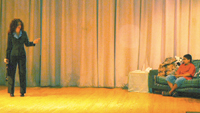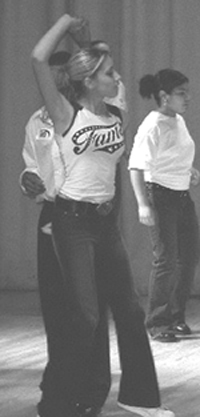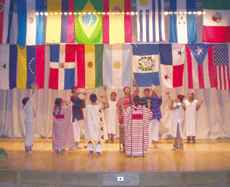TAG: Program Of Success

August 15, 2002
The Talented and Gifted Hispanic Program (TAG) just concluded its 17th year of academic enhancement for youngsters of Latino descent. These youths, who come from middle and high schools around the city of Boston, receive instruction in various areas of academia and social issues that will help them to excel, not only in higher education, but in life as well.
Lucia Mayerson-David, director of TAG since 1985 and educator/administrator at UMass Boston in the Institute for Learning and Teaching (ILT) for some thirty years, and Spencer Sanchez, coordinator and former participant of the program, are the engines that make TAG go. Mayerson-David oversees numerous youth programs within the ILT along with TAG, particularly those that are linked with Boston Public Schools. Sanchez is in charge of the day-to-day operations, not only at UMB, but at the high schools as well. He has been involved with TAG since 1988, first as a student of the program, then later as a TAG tutor. He became the coordinator of TAG in 2000.
Mayerson-David describes her experience with TAG as one of pure enjoyment. “I love it. I wouldn’t do it if I didn’t.”
She also pointed out the uniqueness of the program and the important role it has played in the Boston area. “We are doing something that no one else is doing for Latino kids. The dropout rate for Latinos was extremely high. The program started as a response to the fact that very few Latino students were into the three exams schools in Boston (Boston Latin, Boston Latin Academy, and Boston Tech). We started the program initially to prepare students for entrance into the exams schools. Then we decided that once we got them in, we really needed to support them, so we set up tutoring programs. A few years later, the superintendent of Boston high schools said to me, ‘I’ve heard a lot of good things about your program and I’ll give you the funding, but I want you to expand to district high schools as well.”
After the expansion into three district high schools (Charlestown, English and Dorchester), TAG began diversify its program, branching out. One of the groups is just for exam school kids. TAG prepares the children for academic material that they will encounter in high school, including Latin.
Another of the groups is geared to enrichment and exposure to new environments and experiences. Because of its success, TAG has been looked to as a model to be emulated by other youth oriented programs, academic or otherwise.
With success comes new challenges for TAG, such as preparing and encouraging students who have failed the MCAS, the mandatory state-wide exam that all public schools students must pass before proceeding to the next level of education.
“We now have students in the summer program that may have failed either the English or math section of the MCAS,” said Mayerson-David. “At least half of our students are ones that have had significant troubles, really failed. So they come here to make it up in the summer program, instead of going to their own school.”
Sanchez notes that, although the curriculum is the same as it would be in the district schools, the summer program at UMass Boston comes with “some extra bells and whistles”.
“It’s a university environment. We hired college students to hang out with the kids and be teaching assistants in the classrooms. But it is the same academic material as the kids would have had in the own schools.”
TAG is privileged to bring in quality high school teachers from Boston schools, many from exam schools to teach the youths. Steve Fernandez, a physics teacher from Boston Latin School, is one such respected and dedicated participant.
“Oh, Steve always teaches with us,” said Sanchez, “and that is one of the good things about our program. We are able to retain a solid core of instructors that return year after year, and he’s one of them. He’s cool.”
A prodigious amount of recruitment is done through word of mouth, and the success of the program has spread beyond the Boston region. Families are now sending multiple siblings to TAG, and due to its increased popularity, not everyone can be admitted. There were 250 applicants for approximately 200 spaces.
This summer, TAG had a staff of about 45, an incredible number when one thinks about its humble origins back in the 1980s when the program had four teachers. Six high schools in Boston have direct links with TAG, and the program extends beyond the UMB campus during the academic year. There is also Project Alerta, a similar program that acts as a springboard for children in grades three to five in anticipation of joining TAG in middle school.
Even though TAG has come along way and looks to further expansion, it faces hurdles that cannot be easily overcome.
“We have the capability of having a larger group if we wanted to,” said Mayerson-David, “but the reason we can’t do it is because we can’t get anymore space. We had to fight for space here for years now, because in the summer, space is at a premium. We (IRL) have 14 groups in here during the summer.”
TAG attempts to model the classes here at UMass Boston around the secondary school environment that the students have encountered or will encounter in the near future.
“It depends on the school that the kid came from,” said Sanchez. From 9-12, the kids from the exams schools take Latin, English, science, and math, those who don’t attend the same schools might take study skills, which is like sociology. We had the Princeton Review come in here this year and do test taking prep for the them.”
Sanchez emphasized that TAG engages students in other areas and activities outside academics. “In the afternoon, the kids become involve in extracurricular activities, such as sports, theater, dance. We also had a group put together a magazine/yearbook. There was a group that put together a website. Everyday after school, they were down in the lower level of the Healey Library, working on computers. Some students were sent out to gather information about the program and others went to take photos. Their website has a link on our main site (http://tag.gcoe.umb.edu).”
Mayerson-David gauges the success of TAG by how frequently she hears two questions from the students: Why can’t the program be longer and can we come back next year? “We even have seniors who will graduate ask if they can return,” she chuckles.
One way TAG can include graduates in the future is to hire them as teacher assistants (TAs) for the summer program or as tutors to work with the students during the academic school year. Many graduates of TAG end up back at UMass Boston to attend the university as students of higher education. Graduates of the summer program of TAG are guaranteed admission to UMass Boston upon successful completion of high school. A significant number of the students who have come through TAG end up in other organizations and clubs at the university, particularly ones that are involved with civic and social issues. “It’s a nice circle,” said Mayerson-David.
TAG does not simply limit itself to approaches and initiatives that have worked in the past. Teach Boston, a local organization that steers and guides high school students who are interested in becoming teachers for bilingual programs or ESL programs, hooked up with TAG this past summer. The Teach Boston instructors joined the TAs in the classrooms for a collaborative effort in instructing the students.
The summer program culminated on Thursday August 1 in an extensive graduation ceremony. Parents and relatives packed Snowden auditorium to capacity.
Ismael Ramirez-Soto, dean of the College of Public and Community Service, and Mayerson greeted the audience and gave a little background information about the TAG program and the university. Both spoke with pride and reverence about the accomplishments of the students in the short time span of four weeks.
The keynote speaker was Gibrán Rivera, director of the Massachusetts Education Initiative for Latino Students (MEILS). A former participant of TAG, Rivera spoke to the graduates with candor and conviction about the importance of hard work and mental focus. He spoke about his experience coming up through the program, and the difficulties he had to face in his youth.
The closing ceremonies proceeded to some delightful performances of theater, dance, and readings. These artistic efforts were a way for the students to demonstrate in front of friends and family some of the skills and lessons learned. There was a demonstration of the website created by one of the groups.
After the distribution of diplomas, graduates, guests, and instructors celebrated with a little food and music in the Wheatley cafeteria, another year/summer successfully completed by TAG, and the start down a new path for its graduates.






















































